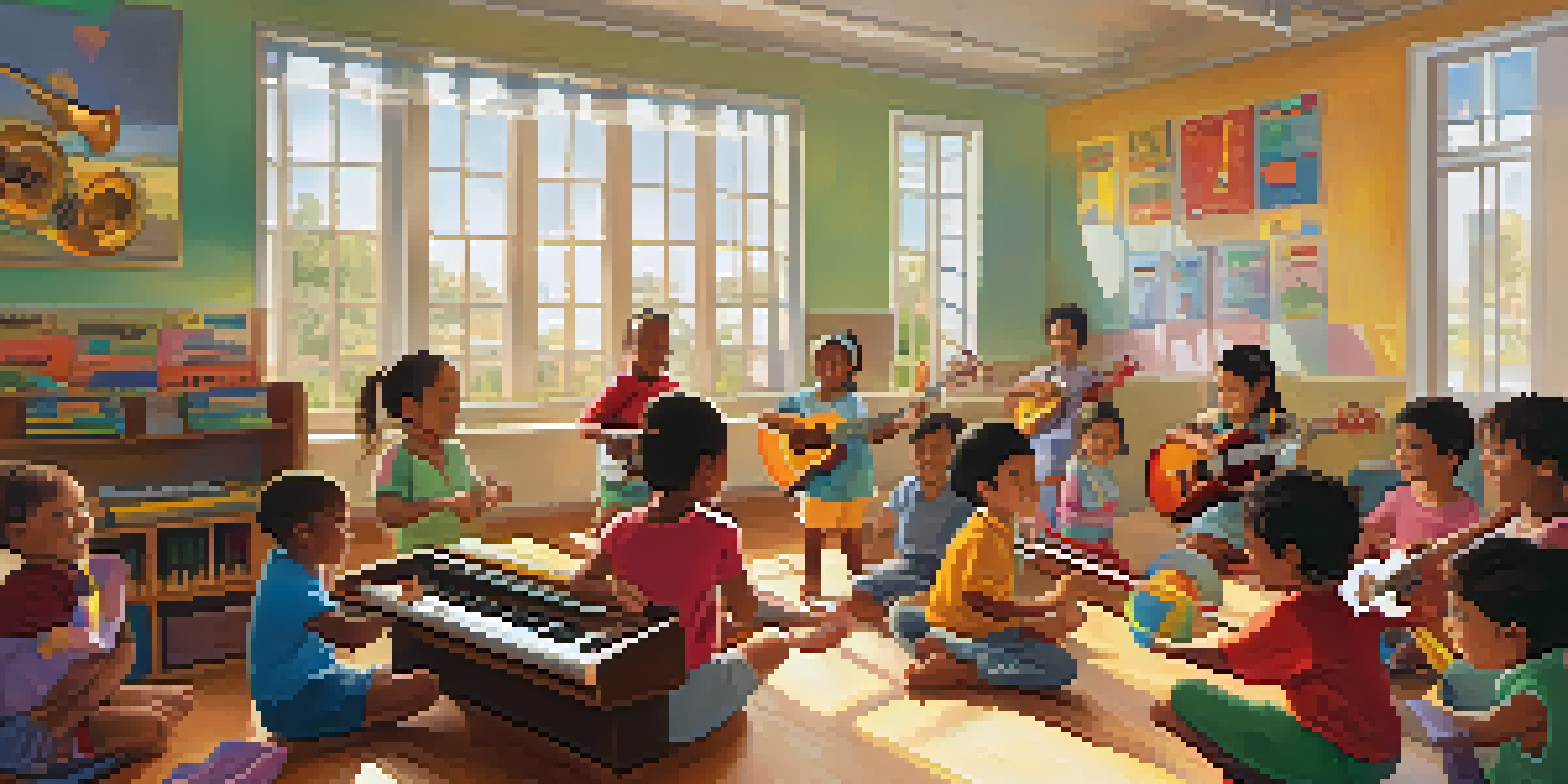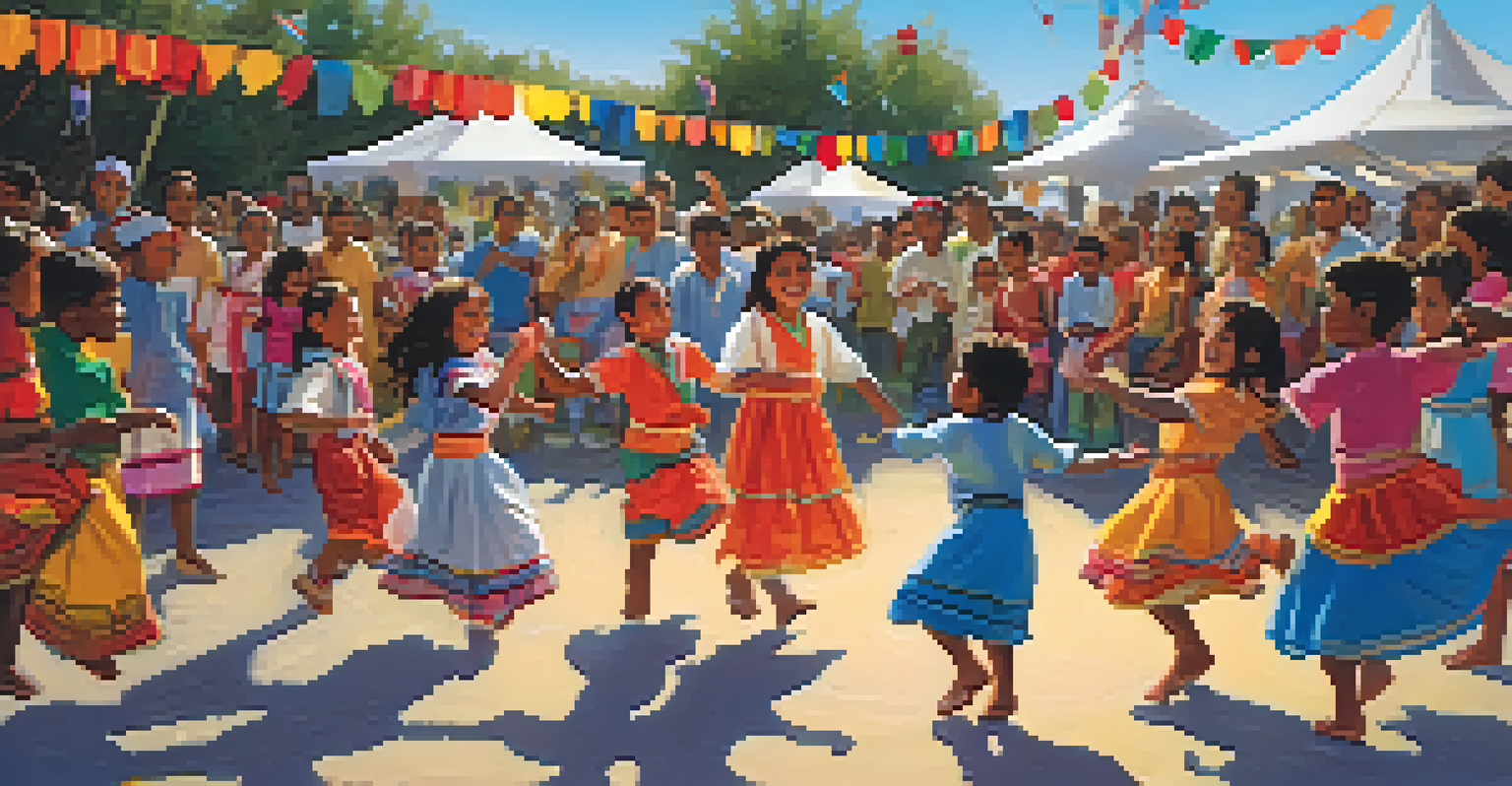The Role of Music in Childhood Development Across Cultures

Understanding Music's Impact on Early Development
Music plays a crucial role in shaping a child's early development. From the moment they are born, babies respond to melodies and rhythms, which can help stimulate their brains. This early exposure not only aids in cognitive growth but also fosters emotional intelligence as they learn to express themselves through sound.
Music can change the world because it can change people.
Research shows that engaging with music can enhance language skills, improve memory, and develop motor skills. For example, children who participate in music classes often show better verbal skills compared to those who don’t. This is because music helps them understand patterns and sounds that are foundational to language acquisition.
Furthermore, music can create a sense of community and belonging among children, allowing them to connect with others through shared experiences. Whether they are singing in a group or playing instruments together, these interactions strengthen social bonds and enhance emotional well-being.
The Role of Music in Different Cultures
Across cultures, music serves as a vital tool for childhood development, but its role can vary significantly. In some cultures, music is integrated into daily life and rituals, fostering a deep connection between children and their heritage. For instance, in African communities, children often learn traditional songs that teach them about history and values.

In contrast, Western cultures may emphasize structured music education, focusing on reading notes and playing instruments. This approach can lead to skill development but might lack the cultural storytelling aspect found in other traditions. Both methods showcase how music can be a powerful vehicle for learning, albeit in different ways.
Music Boosts Early Childhood Skills
Engaging with music enhances cognitive, emotional, and social development in children.
Cultural differences in music education highlight the importance of adapting practices to suit local contexts. By understanding and respecting these variations, educators can create more inclusive environments that celebrate diverse musical traditions while promoting childhood development.
Emotional Benefits of Music for Children
Music has a profound impact on children's emotional health, offering a means of expression and a way to process feelings. When kids listen to or create music, they often find comfort and solace, especially during challenging times. This emotional outlet is crucial for developing resilience and coping strategies.
The music is not in the notes, but in the silence between.
For example, children who engage with music can better articulate their emotions and understand those of others. This skill is vital for building empathy and social awareness, helping them navigate relationships as they grow. Music can also serve as a bonding experience between parents and children, enhancing familial connections.
Moreover, exposure to different types of music can help children appreciate diversity and develop a more inclusive mindset. By experiencing various emotional narratives through music, they learn to empathize with perspectives beyond their own, fostering a sense of global citizenship.
Music as a Tool for Cognitive Development
Engaging with music activates multiple areas of the brain, leading to enhanced cognitive abilities in children. For instance, children who learn to play an instrument often show improved problem-solving skills and enhanced creativity. This cognitive boost can translate into better performance in academic subjects.
Studies suggest that music education can help develop critical thinking skills. For example, as children learn to interpret musical scores, they practice analyzing information and making decisions based on their interpretations. These skills are invaluable not only in music but in various aspects of life.
Cultural Identity Through Music
Music connects children to their cultural heritage, fostering pride and understanding of their roots.
Additionally, rhythm and timing in music can aid in mathematical understanding. When children play rhythm games, they subconsciously practice counting and patterns, reinforcing their math skills in a fun and engaging way. This connection between music and math underscores the importance of incorporating music into educational curricula.
The Influence of Music on Physical Development
Music isn't just a mental exercise; it also plays a role in physical development. Movement is a natural response to music, and dancing can enhance coordination, balance, and motor skills. Children often express themselves through movement, which is essential for their physical growth.
For example, when children participate in music and movement activities, they develop gross motor skills by jumping, spinning, and clapping. These activities enhance their physical fitness and contribute to a healthy lifestyle. Furthermore, they also help children build confidence as they learn to control their bodies in rhythm.
Incorporating music into physical activities, like dance classes or rhythm games, can promote an active lifestyle. This blend of music and movement encourages children to stay engaged and enjoy physical activity, setting the foundation for lifelong health habits.
Music's Role in Cultural Identity and Heritage
For many children, music serves as a vital connection to their cultural identity and heritage. Traditional songs and dances often carry historical significance, allowing children to understand their roots and the values of their ancestors. This sense of belonging is essential for developing a positive self-image.
Through music, children learn about the stories and traditions of their culture, fostering pride and appreciation for their heritage. For instance, indigenous communities often use music as a way to pass down stories and teachings, which helps preserve their cultural identity.
Future of Music Education
As technology evolves, integrating music into education remains essential for holistic child development.
As globalization continues to influence cultures worldwide, maintaining these musical traditions is crucial. Encouraging children to engage with their cultural music helps ensure that these important aspects of identity are passed down to future generations.
The Future of Music in Childhood Development
As we look to the future, the role of music in childhood development is likely to evolve with technology and new educational paradigms. Digital platforms offer children access to a vast array of musical genres and styles, enriching their experiences and broadening their musical horizons. This accessibility can enhance creativity and encourage exploration.
Moreover, the integration of music into modern educational practices is gaining traction. Schools are increasingly recognizing the importance of arts education, and music programs are being incorporated into curriculums to foster holistic development. This shift reflects a growing understanding of how music can enhance learning across various subjects.

However, it's essential to maintain a balance between technology and traditional methods. While online tools and resources can provide valuable learning opportunities, hands-on experiences with live music and instruments remain irreplaceable. Striking this balance will be key to ensuring that music continues to play a vital role in childhood development.